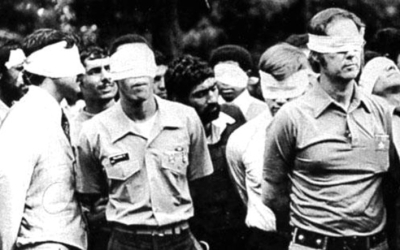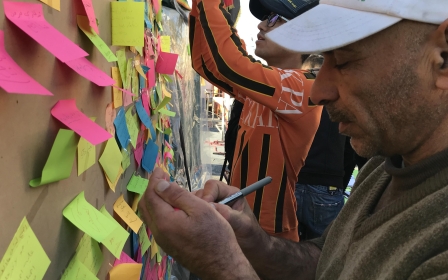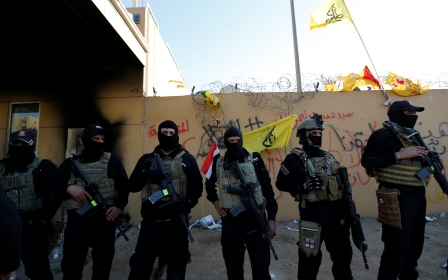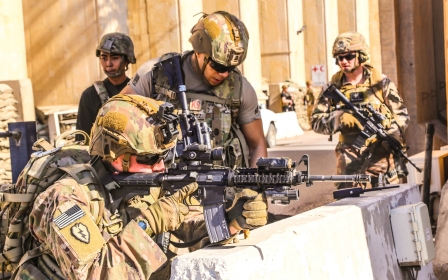Iraqi protesters leave US embassy compound in Baghdad
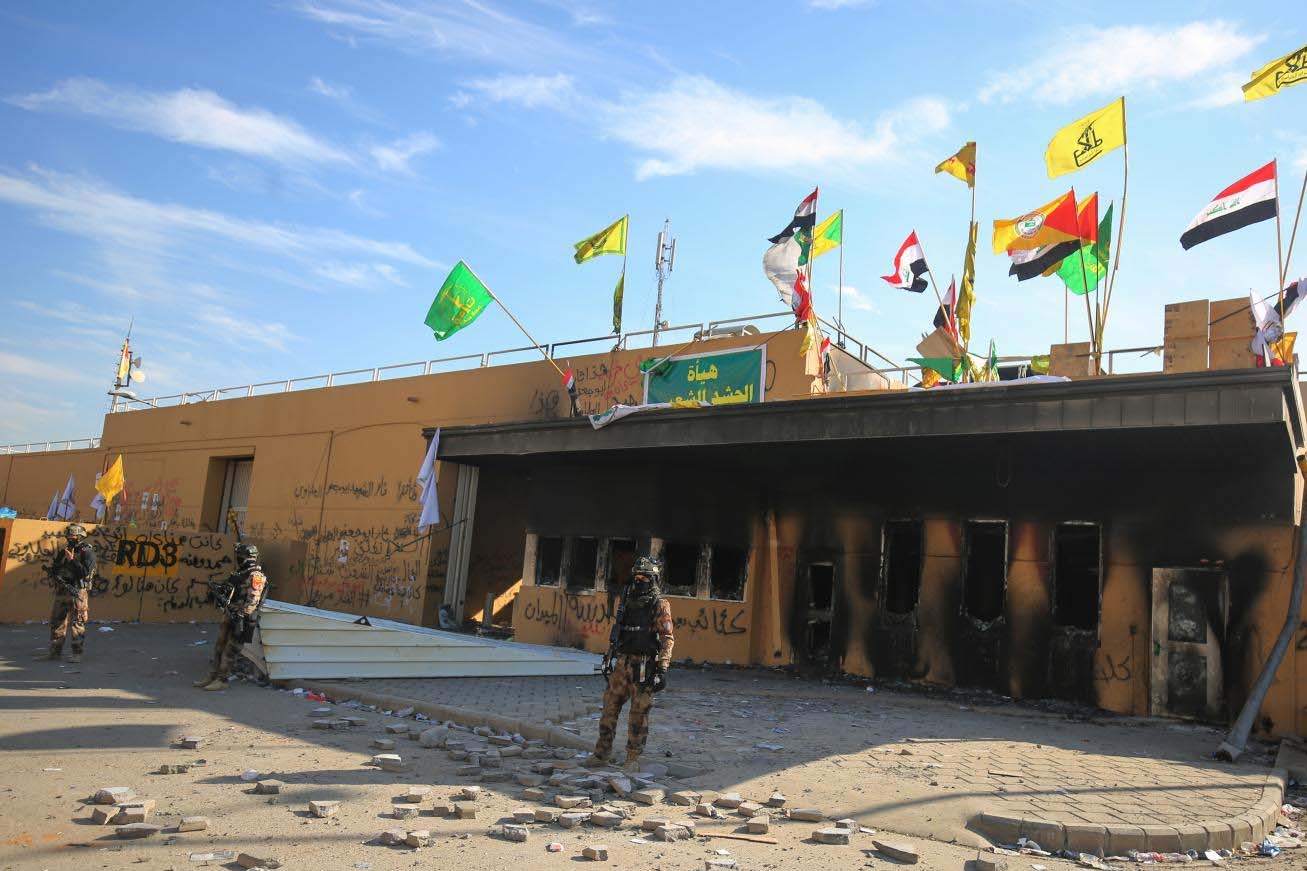
Iraqi protesters have withdrawn from the perimeter fence of the United States embassy in Baghdad, after the pro-Iran Popular Mobilisation Units (PMU) paramilitary group asked them to leave.
On Tuesday, thousands of Iraqis had encircled and vandalised the embassy compound, outraged by US air raids in Iraq and Syria that killed 25 PMU fighters over the weekend.
Angry crowds marched unimpeded through the checkpoints of the usually high-security Green Zone to the embassy gates, where they hurled rocks towards the compound before breaking through a reception area and spraying pro-Iran graffiti on the walls.
Security personnel inside responded with tear gas, wounding at least 20 people, the PMU said.
On Wednesday, the paramilitary group called on its supporters to leave the embassy and gather outside the Green Zone out of "respect" for the state.
New MEE newsletter: Jerusalem Dispatch
Sign up to get the latest insights and analysis on Israel-Palestine, alongside Turkey Unpacked and other MEE newsletters
'We scored a huge win. We arrived to the US embassy, which no one had done before,'
- Kataib Hezbollah
"You delivered your message," the PMU said in a statement.
A photographer with the AFP news agency said they saw protesters dismantling their tents and leaving the Green Zone.
Kataib Hezbollah, the PMU faction targeted in the US raids, initially said it would stay at the embassy, but the group's spokesman Mohammad Mohyeddin later backed down, saying the group was abiding by the PMU's order.
"We scored a huge win: We arrived at the US embassy, which no one had done before," he told AFP.
Pompeo calls protests 'terrorist attack'
The US embassy in Baghdad said in a statement that all public consular operations were suspended. "All future appointments are cancelled. US citizens are advised to not approach the embassy," it said.
Later on Wednesday, US Secretary of State Mike Pompeo condemned what he called an "Iran-backed terrorist attack on US embassy Baghdad" in a phone call with Iraq's acting Prime Minister Adel Abdul Mahdi, the State Department said.
"Secretary Pompeo noted the measures the Government of Iraq has taken to improve the security situation and stressed the Government of Iraq’s obligation to prevent further attacks against our diplomatic mission," the State Department said in a statement.
"The Secretary affirmed that we want an Iraq that is free, independent, and sovereign, and stressed that the United States, under President Trump, will continue to work toward that end."
'You can't do a damn thing'
Tuesday's embassy attack was the latest episode in spiralling tensions between the US and Iran since Washington abandoned a landmark nuclear deal with Tehran in 2018.
Many of those confrontations have played out in Iraq, which has close ties with both governments.
US forces have faced a spate of rocket attacks in recent months, blaming them on Iran-backed fighters.
Last week, one of those attacks killed a US contractor, prompting the retaliatory US air raids that killed 25 fighters from Kataib Hezbollah.
US President Donald Trump and other US officials have blamed Iran for attacks on US forces and the embassy.
"They will pay a very BIG PRICE! This is not a Warning, it is a Threat," Trump wrote on Twitter on Tuesday.
Iran's supreme leader on Wednesday condemned the US attacks in Iraq and warned that Tehran was ready to hit back.
"First of all, you can't do a damn thing. This has nothing to do with Iran," Ayatollah Ali Khamenei said in a speech on state television.
"If the Islamic Republic decides to oppose or fight against a country, it will do this explicitly," he added.
US officials have pressured Iraqi authorities to step up security and sent a rapid response team of Marines overnight to help guard the compound.
US Defense Secretary Mark Esper said about 750 troops from the 82nd Airborne Division were prepared to deploy to the region in the coming days.
No US personnel were injured in the attack and US officials said they had no plans to evacuate.
Washington led the 2003 invasion against the then-leader of Iraq, Saddam Hussein, and it has worked closely with Iraqi officials since, but its influence has waned compared with Tehran's growing clout.
Tuesday's dramatic scenes sparked comparisons with both the 1979 hostage crisis at the US embassy in Tehran and the deadly 2012 attack on the US consulate in Libya's second city Benghazi.
Middle East Eye delivers independent and unrivalled coverage and analysis of the Middle East, North Africa and beyond. To learn more about republishing this content and the associated fees, please fill out this form. More about MEE can be found here.


